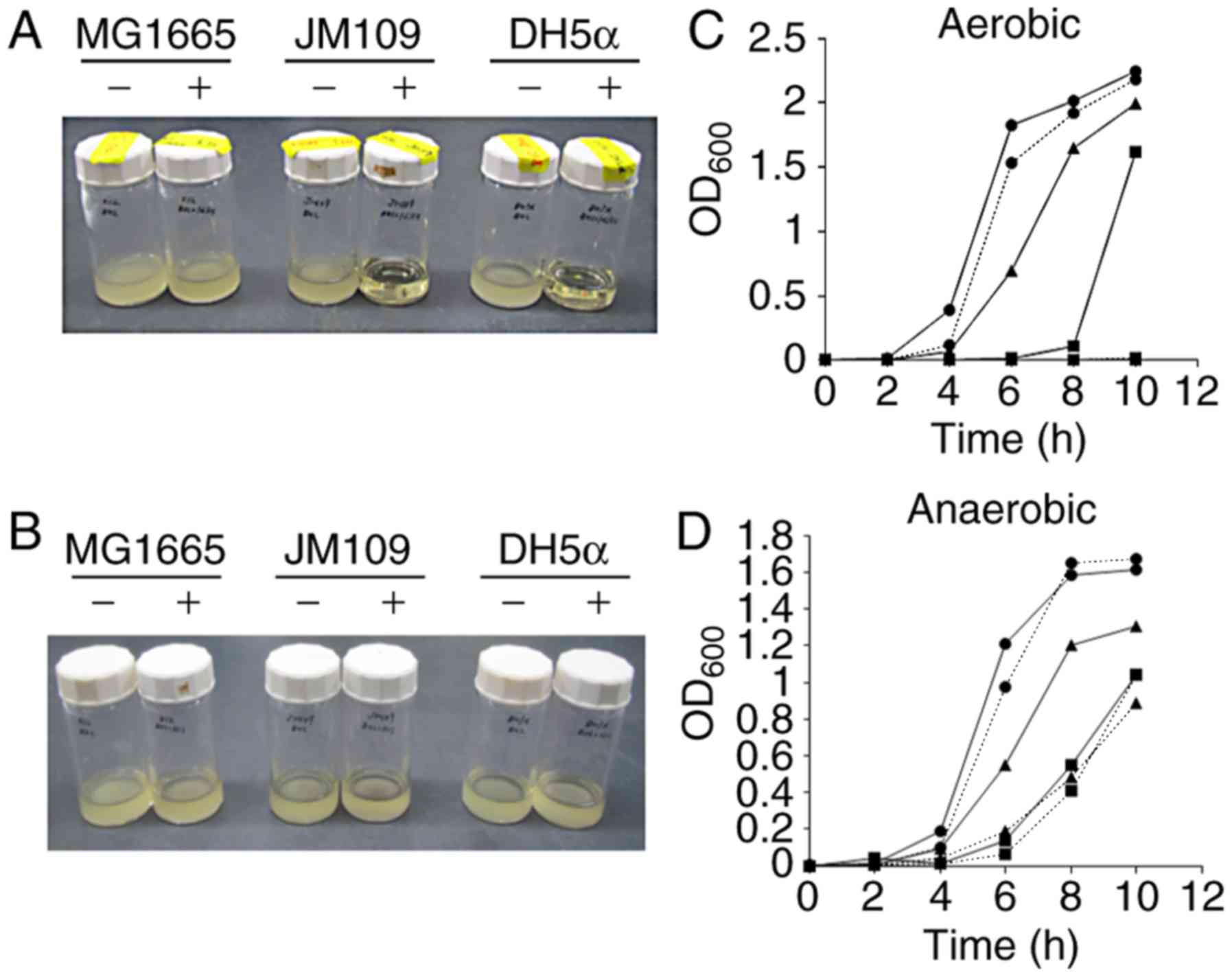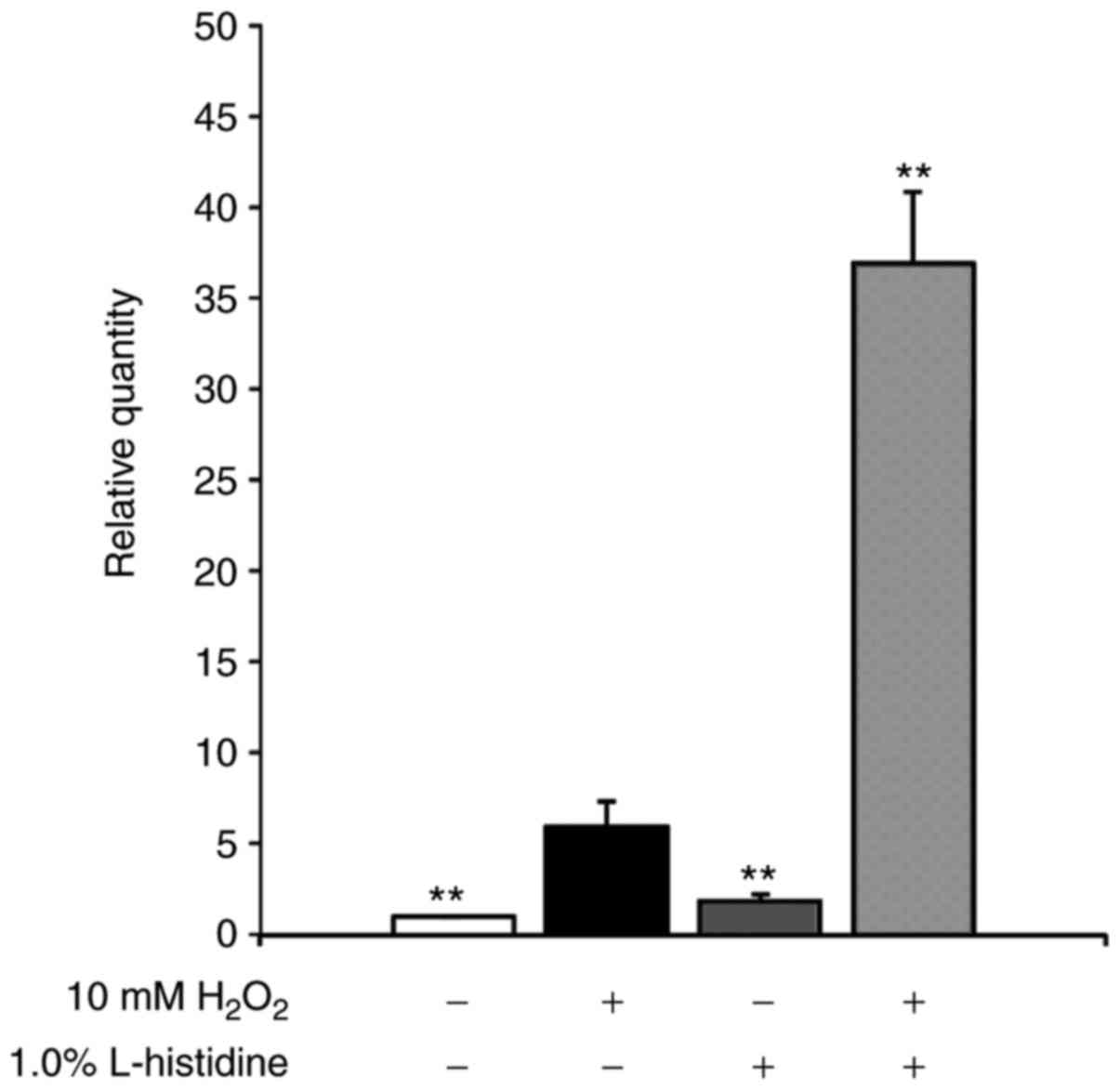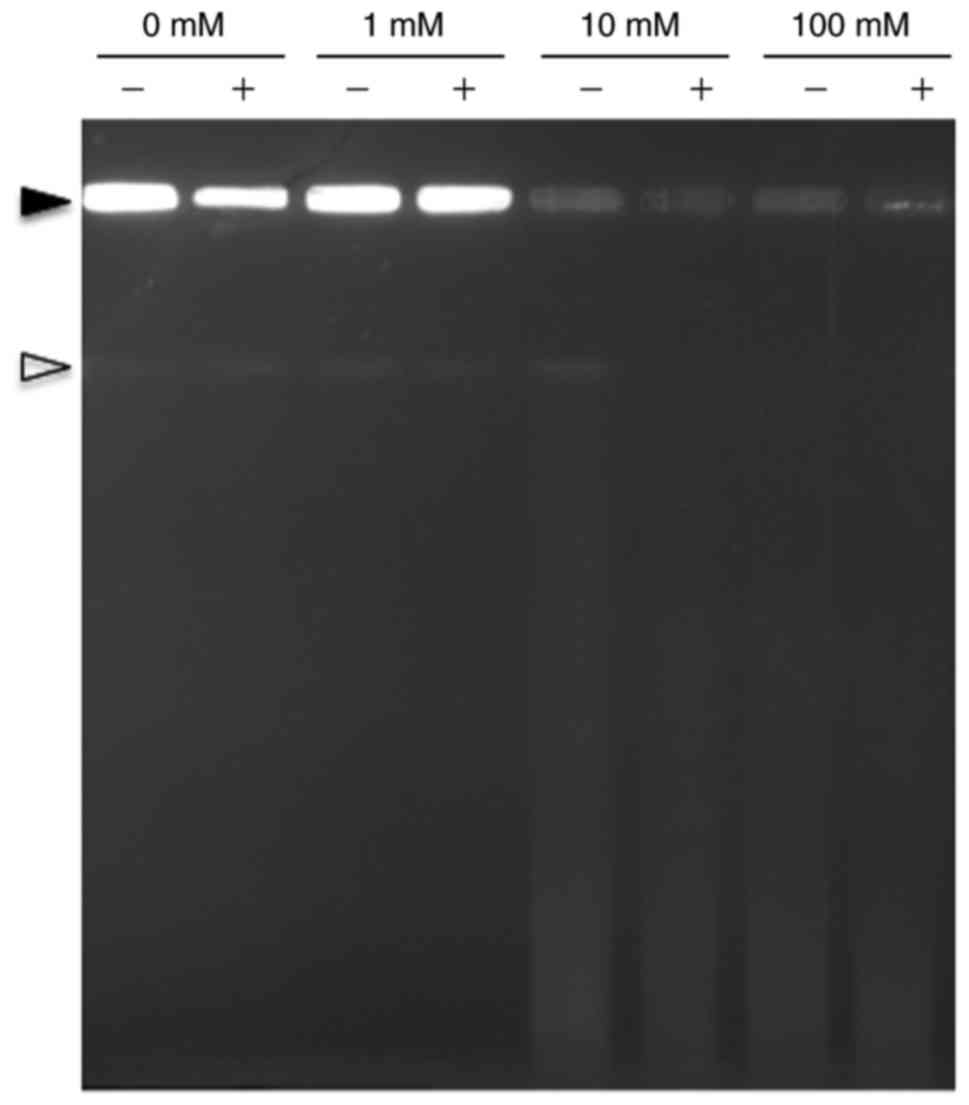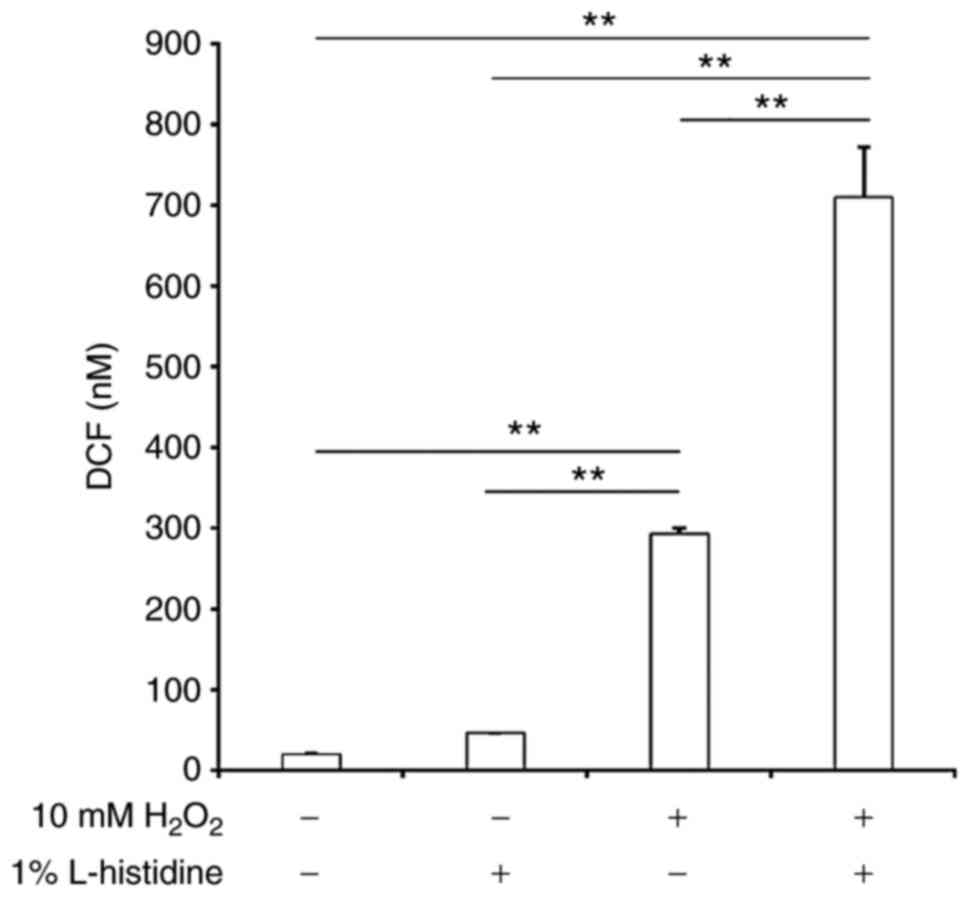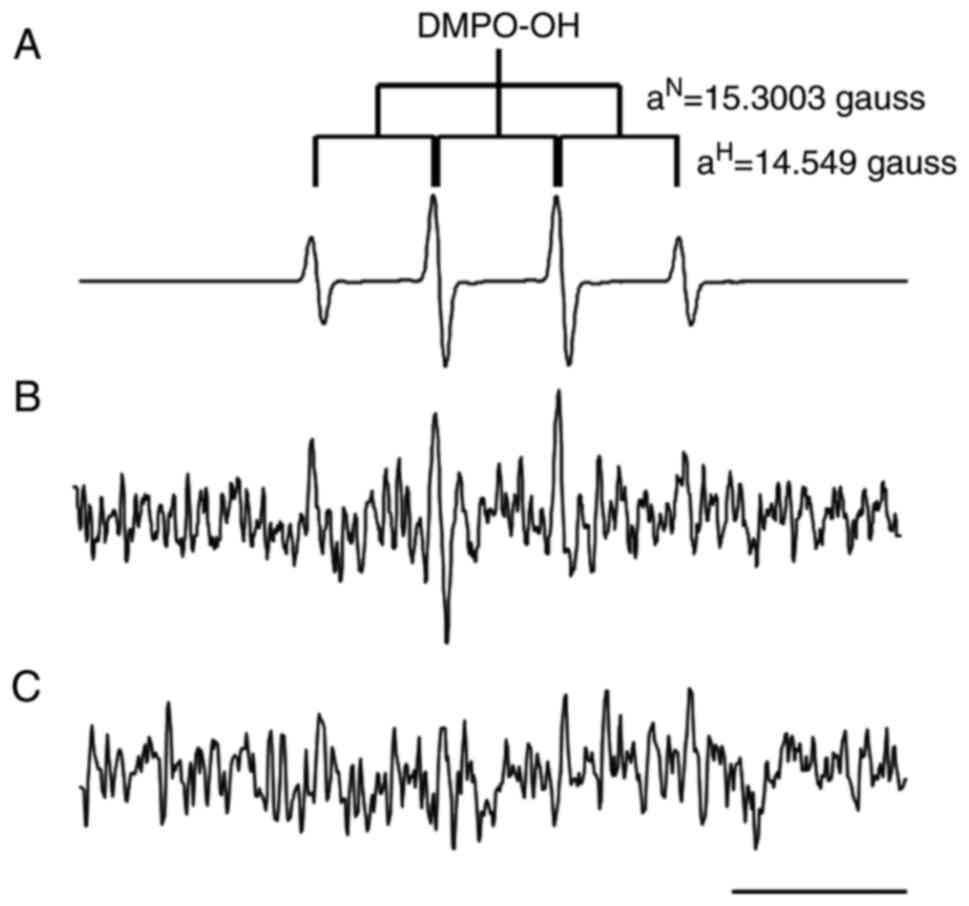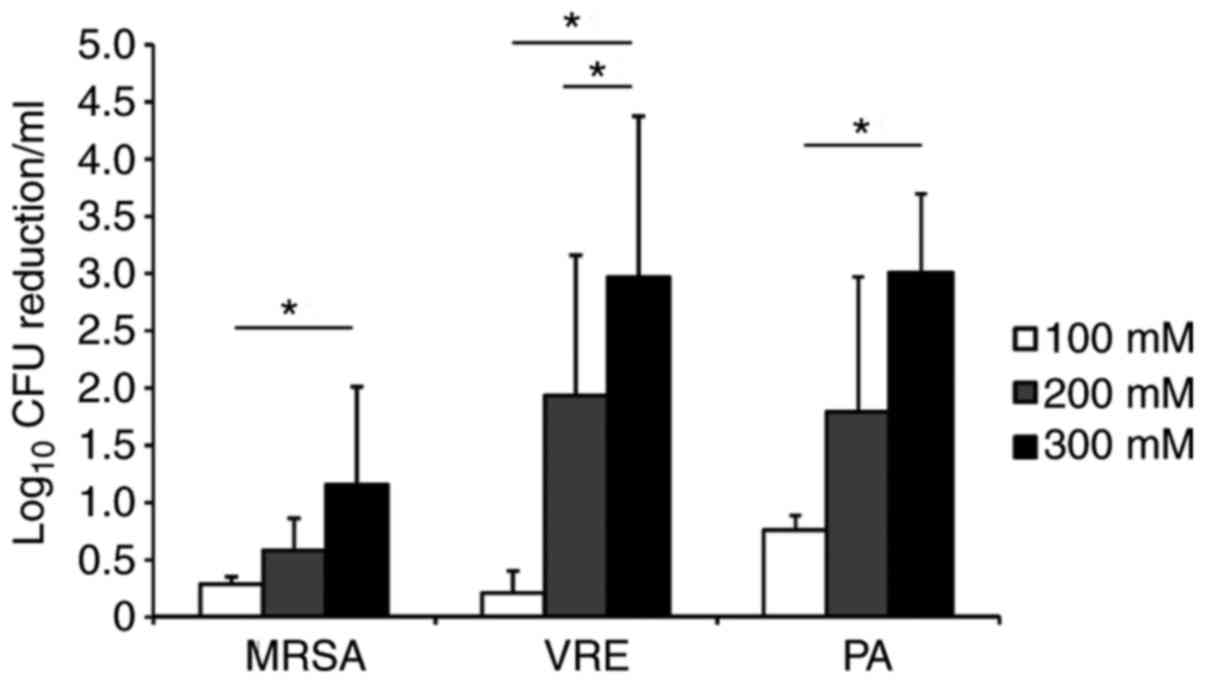|
1
|
Imlay JA: The molecular mechanisms and
physiological consequences of oxidative stress: Lessons from a
model bacterium. Nat Rev Microbiol. 11:443–454. 2013. View Article : Google Scholar : PubMed/NCBI
|
|
2
|
Iuchi S and Weiner L: Cellular and
molecular physiology of Escherichia coli in the adaptation to
aerobic environments. J Biochem. 120:1055–1063. 1996. View Article : Google Scholar : PubMed/NCBI
|
|
3
|
Gort AS and Imlay JA: Balance between
endogenous superoxide stress and antioxidant defenses. J Bacteriol.
180:1402–1410. 1998.PubMed/NCBI
|
|
4
|
Park S, You X and Imlay JA: Substantial
DNA damage from submicromolar intracellular hydrogen peroxide
detected in Hpx− mutants of Escherichia coli. Proc Natl
Acad Sci USA. 102:9317–9322. 2005. View Article : Google Scholar
|
|
5
|
Touati D, Jacques M, Tardat B, Bouchard L
and Despied S: Lethal oxidative damage and mutagenesis are
generated by iron in delta fur mutants of Escherichia coli:
Protective role of superoxide dismutase. J Bacteriol.
177:2305–2314. 1995. View Article : Google Scholar : PubMed/NCBI
|
|
6
|
Oya Y and Yamamoto K: The biological
activity of hydrogen peroxide. IV. Enhancement of its clastogenic
actions by co-administration of L-histidine. Mutat Res.
198:233–240. 1988. View Article : Google Scholar : PubMed/NCBI
|
|
7
|
Schubert J, Watson JA and Baecker JM:
Formation of a histidine-peroxide adduct by
H2O2 or ionizing radiation on histidine:
Chemical and microbiological properties. Int J Radiat Biol Relat
Stud Phys Chem Med. 14:577–583. 1969. View Article : Google Scholar : PubMed/NCBI
|
|
8
|
Sestili P, Cattabeni F and Cantoni O: The
L-histidine-mediated enhancement of hydrogen peroxide-induced DNA
double strand breakage and cytotoxicity does not involve metabolic
processes. Biochem Pharm. 50:1823–1830. 1995. View Article : Google Scholar : PubMed/NCBI
|
|
9
|
Tachon P, Deflandre A and Giacomoni PU:
Modulation by L-histidine of H2O2-mediated
damage of cellular and isolated DNA. Carcinogenesis. 15:1621–1626.
1994. View Article : Google Scholar : PubMed/NCBI
|
|
10
|
McRipley RJ and Sbarra AJ: Role of the
phagocyte in host-parasie interactions. XII. Hydrohgen
peroxide-myeloperoxidase bactericidal system in the phagocyte. J
Bacteriol. 94:1425–1430. 1967.PubMed/NCBI
|
|
11
|
Eschenbach DA, Davick PR, Williams BL,
Klebanoff SJ, Young-Smith K, Critchlow CM and Holmes KK: Prevalence
of hydrogen peroxide-producing Lactobacillus species in normal
women and women with bacterial vaginosis. J Clin Microbiol.
27:251–256. 1989.PubMed/NCBI
|
|
12
|
Seaver LC and Imlay JA: Alkyl
hydroperoxide reductase is the primary scavenger of endogenous
hydrogen peroxide in Escherichia coli. J Bacteriol. 183:7173–7181.
2001. View Article : Google Scholar : PubMed/NCBI
|
|
13
|
Seaver LC and Imlay JA: Hydrogen peroxide
fluxes and compartmentalization inside growing Escherichia coli. J
Bacteriol. 183:7182–7189. 2001. View Article : Google Scholar : PubMed/NCBI
|
|
14
|
Walling C: Fenton's reagent revisited.
Accounts Chem Res. 8:125–131. 1975. View Article : Google Scholar
|
|
15
|
Passaretti CL, Otter JA, Reich NG, Myers
J, Shepard J, Ross T, Carroll KC, Lipsett PL and Perl TM: An
evaluation of environmental decontamination with hydrogen peroxide
vapor for reducing the risk of patient acquisition of
multidrug-resistant organisms. Clin Infect Dis. 56:27–35. 2013.
View Article : Google Scholar
|
|
16
|
Rutala WA, Gergen MF and Weber DJ:
Efficacy of improved hydrogen peroxide against important
healthcare-associated pathogens. Infect Control Hosp Epidemiol.
33:1159–1161. 2012. View
Article : Google Scholar : PubMed/NCBI
|
|
17
|
Ronen Z, Guerrero A and Gros A: Graywater
disinfection with the environmentally friendly hydrogen peroxide
plus (HPP). Chemosphere. 78:61–65. 2010. View Article : Google Scholar
|
|
18
|
Tang WZ and Tassos S: Oxidation kinetics
and mechanisms of trihalomethanes by Fenton's reagent. Water
Research. 31:1117–1125. 1997. View Article : Google Scholar
|
|
19
|
Yu Y, Chan WI, Liao PH and Lo KV:
Disinfection and solubilization of sewage sludge using the
microwave enhanced advanced oxidation process. J Hazard Mater.
181:1143–1147. 2010. View Article : Google Scholar : PubMed/NCBI
|
|
20
|
Oya Y, Yamamoto K and Tonomura A: The
biological activity of hydrogen peroxide. I. Induction of
chromosome-type aberrations susceptible to inhibition by scavengers
of hydroxyl radicals in human embryonic fibroblasts. Mutat Res.
172:245–253. 1986. View Article : Google Scholar : PubMed/NCBI
|
|
21
|
Jung YS, Lim WT, Park JY and Kim YH:
Effect of pH on Fenton and Fenton-like oxidation. Environ Technol.
30:183–190. 2009. View Article : Google Scholar : PubMed/NCBI
|
|
22
|
Aslani H, Nabizadeh R, Alimohammadi M,
Mesdaghinia A, Nadafi K, Nemati R and Ghani M: Disinfection of raw
wastewater and activated sludge effluent using Fenton like reagent.
J Environ Health Sci Eng. 12:1492014. View Article : Google Scholar
|
|
23
|
Orta De Velásquez MT, Yáñez-Noguez I,
Jiménez-Cisneros B and Luna Pabello VM: Adding silver and copper to
hydrogen peroxide and peracetic acid in the disinfection of an
advanced primary treatment effluent. Environ Technol. 29:1209–1217.
2008. View Article : Google Scholar : PubMed/NCBI
|
|
24
|
Steinberg D, Heling I, Daniel I and
Ginsburg I: Antibacterial synergistic effect of chlorhexidine and
hydrogen peroxide against Streptococcus sobrinus, Streptococcus
faecalis and Staphylococcus aureus. J Oral Rehabil. 26:151–156.
1999. View Article : Google Scholar : PubMed/NCBI
|
|
25
|
Zubko EI and Zubko MK: Co-operative
inhibitory effects of hydrogen peroxide and iodine against bacteria
and yeast species. BMC Res Notes. 6:2722013. View Article : Google Scholar
|
|
26
|
Miyasaki KT, Genco RJ and Wilson ME:
Antimicrobial properties of hydrogen peroxide and sodium
bicarbonate individually and in combination against selected oral,
Gram-negative, facultative bacteria. J Dent Res. 65:1142–1148.
1986. View Article : Google Scholar : PubMed/NCBI
|
|
27
|
Carlsson J, Edlund MB and Hanstrom L:
Bactericidal and cytotoxic effects of hypothiocyanite-hydrogen
peroxide mixtures. Infect Immun. 44:581–586. 1984.PubMed/NCBI
|
|
28
|
Humphrey TJ: The synergistic inhibition of
Campylobacter jejuni by rifampicin and hydrogen peroxide. Lett
Apple Microbiol. 10:97–100. 1990. View Article : Google Scholar
|
|
29
|
Martin H and Maris P: Synergism between
hydrogen peroxide and seventeen acids against six bacterial
strains. J Appl Microbiol. 113:578–590. 2012. View Article : Google Scholar : PubMed/NCBI
|
|
30
|
Almeida CE, Felício DL, Galhardo RS,
Cabral-Neto JB and Leitão AC: Synergistic lethal effect between
hydrogen peroxide and neocuproine (2,9-dimethyl
1,10-phenanthroline) in Escherichia coli. Mutat Res. 433:59–66.
1999. View Article : Google Scholar : PubMed/NCBI
|
|
31
|
Shama G: Inactivation of Escherichia coli
by ultraviolet light and hydrogen peroxide in a thin film
contactor. Lett Appl Microbiol. 15:259–260. 1992. View Article : Google Scholar
|
|
32
|
Uemura M, Imataki O, Uchida S,
Nakayama-Imaohji H, Ohue Y, Matsuka H, Mori H, Dobashi H, Kuwahara
T and Kadowaki N: Strain-specific transmission in an outbreak of
ESBL-producing Enterobacteriaceae in the hematooncology care unit:
A cohort study. BMC Infect Dis. 17:262017. View Article : Google Scholar
|
|
33
|
Fujita N, Yoshimura M, Komori T, Tanimoto
K and Ike Y: First report of the isolation of high-level
vancomycin-resistant Enterococcus faecium from a patient in Japan.
Antimicrob Agents Chemother. 42:25101998.
|
|
34
|
Rocha ER and Smith CJ: Regulation of
Bacteroides fragilis katB mRNA by oxidative stress and carbon
limitation. J Bacteriol. 179:7033–7039. 1997. View Article : Google Scholar : PubMed/NCBI
|
|
35
|
Kim YS, Min J, Hong HN, Park JH, Park KS
and Gu MB: Gene expression analysis and classification of mode of
toxicity of polycyclic aromatic hydrocarbons (PAHs) in Escherichia
coli. Chemosphere. 66:1243–1248. 2007. View Article : Google Scholar
|
|
36
|
Livak KJ and Schmittgen TD: Analysis of
relative gene expression data using real-time quantitative PCR and
the 2(−Delta Delta C(T)) method. Method. 25:402–408. 2001.
View Article : Google Scholar
|
|
37
|
Oya-Ohta Y, Ueda A, Ochi T, Harada M and
Yamamoto K: The biological activity of hydrogen peroxide VII.
L-Histidine increases incorporation of H(2)O(2) into cells and
enhances formation of 8-oxodeoxyguanosine by UV-C plus H(2)O(2) but
not by H(2)O(2) alone. Mutat Res. 478:119–127. 2001. View Article : Google Scholar : PubMed/NCBI
|
|
38
|
Duling DR: Simulation of multiple
isotropic spin-trap EPR spectra. J Magn Reson B. 104:105–110. 1994.
View Article : Google Scholar : PubMed/NCBI
|
|
39
|
Buettner GR: Spin trapping: ESR parameters
of spin adducts. Free Radic Biol Med. 3:259–303. 1987. View Article : Google Scholar : PubMed/NCBI
|
|
40
|
Kaye KS and Pogue JM: Infections caused by
resistant gram-negative bacteria: Epidemiology and management.
Pharmacotherapy. 35:949–962. 2015. View Article : Google Scholar : PubMed/NCBI
|
|
41
|
Sjölund-Karlsson M, Folster JP, Pecic G,
Joyce K, Medalla F, Rickert R and Whichard JM: Emergence of
plasmid-mediated quinolone resistance among non-typhi Salmonella
enterica isolates from humans in the United States. Antimicrob
Agents Chemother. 53:2142–2144. 2009. View Article : Google Scholar : PubMed/NCBI
|
|
42
|
Bielaszewska M, Mellmann A, Zhang W, Köck
R, Fruth A, Bauwens A, Peters G and Karch H: Characterisation of
the Escherichia coli strain associated with an outbreak of
haemolytic uraemic syndrome in Germany, 2011: A microbiological
study. Lancet Infect Dis. 11:671–679. 2011. View Article : Google Scholar : PubMed/NCBI
|
|
43
|
Mellmann A, Harmsen D, Cummings CA, Zentz
EB, Leopold SR, Rico A, Prior K, Szczepanowski R, Ji Y, Zhang W, et
al: Prospective genomic characterization of the German
enterohemorrhagic Escherichia coli O104:H4 outbreak by rapid next
generation sequencing technology. PLoS One. 6:e227512011.
View Article : Google Scholar : PubMed/NCBI
|
|
44
|
Tzouvelekis LS, Markogiannakis A,
Psichogiou M, Tassios PT and Daikos GL: Carbapenemases in
Klebsiella pneumoniae and other Enterobacteriaceae: An evolving
crisis of global dimensions. Clin Microbiol Rev. 25:682–707. 2012.
View Article : Google Scholar : PubMed/NCBI
|
|
45
|
Oosterik L, Tuntufye HN, Janssens S,
Butaye P and Goddeeris BM: Disinfection by hydrogen peroxide
nebulization increases susceptibility to avian pathogenic
Escherichia coli. BMC Res Notes. 8:3782015. View Article : Google Scholar : PubMed/NCBI
|
|
46
|
Iwase T, Uehara Y, Shinji H, Tajima A, Seo
H, Takada K, Agata T and Mizunoe Y: Staphylococcus epidermidis Esp
inhibits Staphylococcus aureus biofilm formation and nasal
colonization. Nature. 465:346–349. 2010. View Article : Google Scholar : PubMed/NCBI
|















